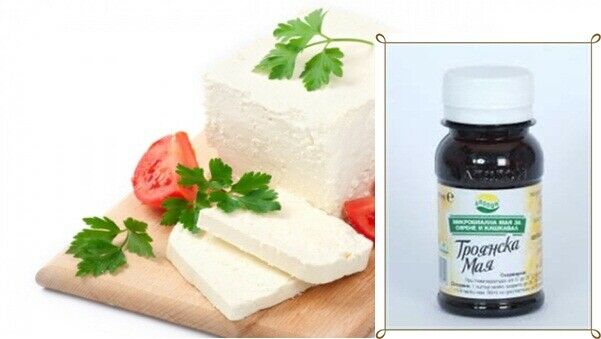-40%
60 ml Natural liquid animal calf cheese making rennet feta Exp.2023
$ 3.06
- Description
- Size Guide
Description
Traditional natural liquid Animal calf cheese making rennet feta 60 mlFor making a quality white brined cheese besides quality yeast such as that of "Apolon-69" EOOD, it is necessary to have quality milk from healthy, well-fed animals as well as to meet the technological requirements for its processing. Sweetened milk is squeezed through 5-6 layers of cheese in another clean container. If the cheese is immediately processed into cheese, it is hardened at 35-38 ° C. When it is not processed immediately after it has been fermented, the milk is preferably cooled down to 10 ° C or in the tap water to be stored and stored for processing. Such milk to be chewed is heated to 72 ° C for cow and 68 ° C for sheep, kept at this temperature for 10 minutes and then cooled to 35-38 ° C. Soaking the milk that has just been drank and stored at low temperature and then warmed up with 5-8 drops of rennet yeast per liter. This mixture is poured into the milk in portions with continuous stirring. It is recommended to add one tablespoon of yoghurt every 4-5 liters before placing the rennet yeast, with good stirring. Milking is done for 60-70 minutes, then cut into 2 cm cubes. Allow to stand for 15-20 minutes and then pour into a sieving strainer. For larger quantities of milk (over 20 liters), the re-infused milk is transferred to the table with a flat spoon, with separate portions arranged tile-like. This way the cut cheese is cut to 2 cm in length and across. When ripening is done correctly, the surface of the sliced cheese is covered with whey. The whole mass is poured carefully into a pre-dampened strainer and tied. After squeezing for 20-30 minutes, the suture is loosened, the end is lifted and tied again. After another 20-30 minutes of cutting, the molded block is broken by hand and shaped into a mold with a regular shape, a lid or other plate and a weight of 0.8 - 1 kg. per kilogram of cheese. The end of the compression is determined by the separation of the whey. It is finished when the whey begins to slowly decay. It should be known that 1 kg. mature cheese comes from about 6-7 liters of cow or goat milk and 5-6 liters of sheep and buffalo milk. After compression, the slicer is loosened and the cheese is cut into pieces in the correct shape so that the storage container is well stocked when stacked. At the bottom of the container and the first row of cheese, salt is not placed. The required quantity of 60-70 grams per kilogram of cheese is distributed among the other rows. After filling the dish, if the brine does not cover the cheese, an addition of a pasteurized beer containing 10% salt is added. Zinc for the brine is obtained from the collected whey when pressing the cheese. The same is continuously boiled over a direct fire until the curds cross the cottage cheese and then straining. The filled container with cheese is tightly closed and placed to ripen in refrigerators, in cold cellars or other cool rooms. Where the intended receptacle can not be filled with the cheese obtained from a batch of milk, the weight must be applied on the last line so that all the pieces are covered with brine and not displaced when the container is moved. The optimal storage temperature of the cheese is 10-12 ° C, for 40-45 days. After this period, mature cheese is stored in cold cellars or other cool areas. The most suitable storage temperature is 2-4 ° C.
Sequence in the production of white brined cheese
Pasteurization of cow's milk takes place at 72-74 degrees Celsius.
Pasteurisation of sheep's milk takes place at 68-70 degrees Celsius.
After cooling to 38-40 ° C, add:
1. Yeast - the required quantity of yeast is activated in 1 liter of pasteurized and chilled to 45 ° C milk for 15-20 minutes. It is then added to the rest of the milk intended for curdling under good stirring.
2. Calcium dichloride - Dosage: 200-300 ml. for 1000 liters of milk or 5-6 drops per liter.
3. Yeast for cheese activity - 1:12,000 dosage:
for cows and goats milk 200-300 ml for 1000 liters of milk or 5-6 drops per liter
for sheep and buffalo milk 250-350 ml for 1000 liters of milk or 6-8 drops per liter
4. Pressing
5. Salting: In 19% salt brine for 24 hours or dry salting.
6. Cheeses for ripening cheese:
9% salinity of the solution
60-70 milliliters of lactic acid from 40% for 10 liters of brine.









